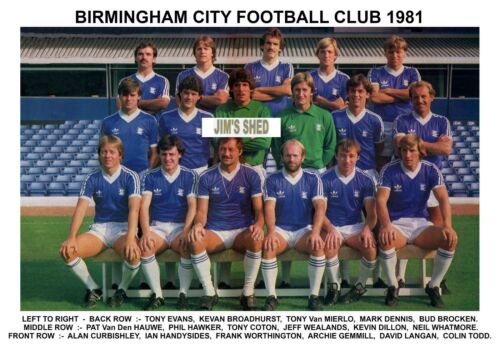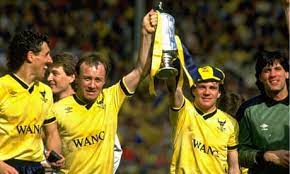5. Jul, 2022
OXFORD UNITED; THE Us GAIN FIRST CLASS HONOURS
A couple of weeks ago I was sad to hear that a good friend had passed away. I met her whilst on holiday in Spain. She was helping her friend who was in a wheelchair. Despite been in her late Sixties then, she had a remarkable zest for Ilfe, in her Seventies she was driving all over the Country.
My friend lived near Oxford, her commendable adventurous spirit was mirrored by the City's football team. From humble origins as plain old Headington United, named after a district of the city to League Cup winners. Oxford United's story is equally uplifting. Oxford was hardly a football hotbed in the early 80s. While thousands of students studied at the the city's World famous university, author Colin Dexter was penning the Inspector Morse novels, our hero the highly articulate, if a little grumpy Detective who solved crimes under the dreaming spires.
The height of sporting excellence was reserved for a 4 mile stretch of The River Thames, where each April Oxford University's boat race team would duly canter to victory. Eight Oarsmen under the direction of one Cox sporting dark blue inflicting more misery on their Cambridge counterparts. In the 1980's Oxford University were victorious on 9 occasions, only the meanest of spirits would not feel sympathy for the hapless light blues
Yet in the background little old Headington were beginning to turn heads. They won the Southern League 3 times between 1954 and 1961. In 1954 they reached the FA Cup 4th Round, knocking out league clubs Millwall and Stockport County. In 1959 former Birmingham City boss Arthur Turner was appointed manager. A year later the club changed its name to Oxford United, it was felt that the new name would give the club a higher profile nationally
It proved a wise decision when the club was elected to the Football League. The Us were elected in 1962 following the liquidation of Accrington Stanley. The Lancashire club had folded following severe financial problems. Within 2 years a yellow shirted Oxford team had reached a FA Cup Quarter Final. Captained by a young Ron Atkinson, United beat First Division Blackburn Rovers on the way. By 1967 the Us were a Second Division club, a truly meteoric rise. The Yellows pitted their wits against Manchester United and Aston Villa during the 1974-75 season. Both fallen giants were now Second Division clubs, the little club had come a long way.
Oxford were relegated the following season and seemed consigned to lower league football. Robert Maxwell arrived in 1981, the media tycoon lived in Oxfordshire and transformed the club's fortunes. A year later the new chairman appointed Jim Smith as manager. Smith had recently been sacked by First Division Birmingham City and had a point to prove. After a year of consolidation the Us were promoted to the Second Division in 1984. Oxford were crowned champions with a mighty impressive 95 points. United finished eight points clear of second place Wimbledon, another small club making mighty strides (more of them later). As the Yellows closed in on the title Smith signed striker John Aldridge from Newport County, it was to prove an inspired signing.
The following season Aldridge scored 34 goals as the Us added the Second Division title. Becoming the first club to win the Third and Second Division titles in successive seasons, a record which still stands. Aldridge formed a prolific strike partnership with Billy Hamilton. The Irishman bagged 18 goals, as United were promoted to the First Division for the first time in their history.
Oxford United played some thrilling football. Match Of The Day viewers were richly entertained as the cameras witnessed the 5-2 wins over Leeds United and Oldham Athletic. The Us also had a formidable defence containing Malcolm Shotten and Gary Briggs. Shotten and Briggs sounds more like a northern industrial firm rather then Oxford United's central defence, they certainly took no prisoners
The club's exploits were not confined to the league. In 1984 they knocked Manchester United out of the League Cup, ironically the visitors were managed by Ron Atkinson. A very unhappy return to the Manor Ground as the Red Devils were unable to cope with the notorious sloping pitch. Visiting teams must dreaded a trip to the quaint old ground.
The Second Division Championship must have been particularly sweet for Jim Smith. Oxford beat Birmingham City to the title. The Blues and Manchester City had to be satisfied with promotion. Sadly the feel good factor didn't last. Having led his team to the promised land Smith was expecting an improved contract. When his request was declined, Smith resigned and became the new manager of Queens Park Rangers.
Chief Scout Maurice Evans stepped into the hot seat. Evans had managerial experience, in 1977 he led local rivals Reading to the Fourth Division Championship. In September 1985 Evans signed midfielder Ray Houghton from Fulham. Once again Oxford had unearthed a gem, Houghton's vision and passing range helped maintain their place in the top flight. It was a tight run thing, a last day win over Arsenal clinching safety. United also beat championship chasing Everton in the run-in. The Manor Ground defeat effectively ended the Toffees title challenge.
But the 1985-86 season will be largely remembered for the unlikely League Cup triumph. Having disposed of Northampton Town, Newcastle United, Norwich City and Portsmouth, Oxford faced Aston Villa in 2 legged Semi Final. An Aldridge double secured 2-2 draw at Villa Park. Oxford dominated the second leg. Man of the Match Houghton creating two chances with defence splitting passes. The home side deservingly opened the scoring on 57 minutes. Trevor Hebberd's though ball was nodded on by Aldridge, midfielder Les Phillips latched on to the knocked down and hammered a shot past Nigel Spink. The Us booked their Wembley ticket 16 minutes later. Hebberd floated a free kick to the far post. John Aldridge headed the ball across the face of the goal and Jeremy Charles applied the finishing touch. A late Mark Walters volley gave Villa hope, but United hung on.
Remarkably Oxford faced Jim Smith's Queens Park Rangers at Wembley. Rangers were the favourites having beaten the mighty Liverpool in the other Semi Final. The final was a surreal experience for Smith. In his autobiography the Bald Eagle describes leading a team out at Wembley and been more familiar with the opposition players wearing yellow shirts. That unease appeared to spread to the Rangers team who froze on the day.
Oxford broke the deadlock on 40 minutes. Trevor Hebberd was released on the left, the midfielder cut inside Allan MacDonald before squeezing a shot inside goalkeeper's Paul Barron's near post. The underdogs doubled their lead 12 minutes into the second half. Ray Houghton's put Hebberd clear. After advancing into the penalty area Hebberd then returned the compliment. Without breaking stride, Houghton clipped his shot over Barron and into the net. Victory was wrapped up 4 minutes from time. Hebberd played a one two with Aldridge. Aldridge ran clear and unleashed a rasping shot that was parred by Baron. The rebound fell perfectly for Charles, who tapped the ball home, 3-0 and game over.
Moments later Malcolm Shotten led his victorious team up the Wembley steps before lifting the cup skywards. In those days the competition was sponsored by the milk board and was rebranded the Milk Cup. The cover photo shows Houghton and full back David Langan parading the cup around Wembley. Maurice Evans was awarded a winners medal but invited long serving physio Ken Fish to accept the accolade. Fish had served the club for 20 years. It was a wonderful gesture from the Oxford United manager.
Sadly the cup win proved the pinnacle of a golden era Two years later they were relegated and Maurice Evans was sacked. Former Liverpool and Republic of Ireland defender Mark Lawrenson took over but was unable to save them from the drop. Aldridge and Houghton were sold to Liverpool and enjoyed further glories on Merseyside. They also linked up on the International stage. Both played for the Republic Of Ireland at Euro 88, the 1990 and 1994 World Cups. Houghton scored memorable winning goals against England (1988) and Italy (1994).
Meanwhile their former club continued to plummet. In 2006 Oxford were relegated from the Football League. Ironically National League Champions Accrington Stanley replaced Oxford in the Football League, a total role reversal from 1962. Jim Smith had returned as manager but was unable to bring league Football back to The Manor. In 2010 Chris Wilder did return Oxford to League Two.
Oxford United were a feel good story of the 80s. It would be naïve to label it a rags to riches story. Robert Maxwell's millions certainly gave them a considerable helping hand. It appears that the larger then life chairman had a limited knowledge of football. He felt that Aldridge deserved an England call up, the striker had already been capped by the Republic Of Ireland. In fairness Maxwell's 1986 departure to Derby County triggered the Yellows decline. But to win a major trophy and play top flight football for three years. would baffle dear old Endeavour Morse

